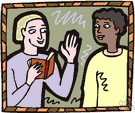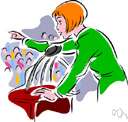phrase
(redirected from phrases)Also found in: Thesaurus, Idioms, Encyclopedia.
Related to phrases: Idioms
phrase
Grammatical phrases are groups of two or more words that work together to perform a single grammatical function in a sentence. Unlike clauses, phrases do not contain both a subject and a predicate (although they sometimes function as one or the other).
phrase
(frāz)n.
1. A sequence of words that have meaning, especially when forming part of a sentence.
2.
a. A characteristic way or mode of expression: an apt turn of phrase.
b. A brief, apt, and cogent expression: the phrase "out of the frying pan and into the fire."
3. Music A short passage or segment, often consisting of four measures or forming part of a larger unit.
4. A series of dance movements forming a unit in a choreographic pattern.
v. phrased, phras·ing, phras·es
v.tr.
1. To express orally or in writing: The speaker phrased several opinions.
2. Music
a. To divide (a passage) into phrases.
b. To combine (notes) in a phrase.
v.intr.
1. To make or express phrases.
2. Music To perform a passage with the correct phrasing.
[Latin phrasis, diction, from Greek, speech, diction, phrase, from phrazein, to point out, show; see gwhren- in Indo-European roots.]
phras′al adj.
phras′al·ly adv.
American Heritage® Dictionary of the English Language, Fifth Edition. Copyright © 2016 by Houghton Mifflin Harcourt Publishing Company. Published by Houghton Mifflin Harcourt Publishing Company. All rights reserved.
phrase
(freɪz)n
1. (Grammar) a group of words forming an immediate syntactic constituent of a clause. Compare clause1, noun phrase, verb phrase
2. a particular expression, esp an original one
3. (Classical Music) music a small group of notes forming a coherent unit of melody
4. (Dancing) (in choreography) a short sequence of dance movements
vb (tr)
5. (Classical Music) music to divide (a melodic line, part, etc) into musical phrases, esp in performance
6. to express orally or in a phrase
[C16: from Latin phrasis, from Greek: speech, from phrazein to declare, tell]
Collins English Dictionary – Complete and Unabridged, 12th Edition 2014 © HarperCollins Publishers 1991, 1994, 1998, 2000, 2003, 2006, 2007, 2009, 2011, 2014
phrase
(freɪz)n., v. phrased, phras•ing. n.
1. a sequence of two or more words arranged in a grammatical unit and lacking a finite verb or such elements of clause structure as subject and verb, as a preposition and a noun or pronoun, an adjective and noun, or an adverb and verb, esp. such a construction acting as a unit in a sentence.
2. a characteristic, current, or proverbial expression.
3. a way of speaking, mode of expression, or phraseology.
4. a brief utterance or remark.
5. a division of a musical composition, commonly a passage of four or eight measures, forming part of a period.
6. a sequence of dance motions making up part of a choreographic pattern.
v.t. 7. to express or word in a particular way.
8. to express in words.
9.
v.i. a. to mark off or bring out the phrases of (a piece of music), esp. in execution.
b. to group (notes) into a phrase.
10. to perform a musical passage or piece with proper phrasing.
[1520–30; (n.) back formation from phrases, pl. of earlier phrasis < Latin: diction, style < Greek phrásis, derivative of phrázein to show]
Random House Kernerman Webster's College Dictionary, © 2010 K Dictionaries Ltd. Copyright 2005, 1997, 1991 by Random House, Inc. All rights reserved.
phrase
Past participle: phrased
Gerund: phrasing
| Imperative |
|---|
| phrase |
| phrase |
Collins English Verb Tables © HarperCollins Publishers 2011
phrase
A group of words forming a unit that is not a complete sentence.
Dictionary of Unfamiliar Words by Diagram Group Copyright © 2008 by Diagram Visual Information Limited
ThesaurusAntonymsRelated WordsSynonymsLegend:
Switch to new thesaurus
| Noun | 1. |  phrase - an expression consisting of one or more words forming a grammatical constituent of a sentence phrase - an expression consisting of one or more words forming a grammatical constituent of a sentencegrammatical construction, construction, expression - a group of words that form a constituent of a sentence and are considered as a single unit; "I concluded from his awkward constructions that he was a foreigner" nominal, nominal phrase, noun phrase - a phrase that can function as the subject or object of a verb verb phrase, predicate - one of the two main constituents of a sentence; the predicate contains the verb and its complements prepositional phrase - a phrase beginning with a preposition pronominal, pronominal phrase - a phrase that functions as a pronoun response - a phrase recited or sung by the congregation following a versicle by the priest or minister catch phrase, catchphrase - a phrase that has become a catchword |
| 2. | phrase - a short musical passage melodic line, melodic phrase, melody, tune, strain, air, line - a succession of notes forming a distinctive sequence; "she was humming an air from Beethoven" musical passage, passage - a short section of a musical composition ligature - (music) a group of notes connected by a slur ostinato - a musical phrase repeated over and over during a composition | |
| 3. | phrase - an expression whose meanings cannot be inferred from the meanings of the words that make it up locution, saying, expression - a word or phrase that particular people use in particular situations; "pardon the expression" in the lurch - in a difficult or vulnerable position; "he resigned and left me in the lurch" like clockwork - with regularity and precision; "the rocket launch went off like clockwork" | |
| 4. | phrase - dance movements that are linked in a single choreographic sequence dancing, terpsichore, dance, saltation - taking a series of rhythmical steps (and movements) in time to music | |
| Verb | 1. |  phrase - put into words or an expression; "He formulated his concerns to the board of trustees" phrase - put into words or an expression; "He formulated his concerns to the board of trustees"ask - direct or put; seek an answer to; "ask a question" lexicalise, lexicalize - make or coin into a word or accept a new word into the lexicon of a language; "The concept expressed by German `Gemuetlichkeit' is not lexicalized in English" formularise, formularize - express as a formula |
| 2. | phrase - divide, combine, or mark into phrases; "phrase a musical passage" |
Based on WordNet 3.0, Farlex clipart collection. © 2003-2012 Princeton University, Farlex Inc.
phrase
noun
verb
Collins Thesaurus of the English Language – Complete and Unabridged 2nd Edition. 2002 © HarperCollins Publishers 1995, 2002
phrase
noun1. A word or group of words forming a unit and conveying meaning:
The American Heritage® Roget's Thesaurus. Copyright © 2013, 2014 by Houghton Mifflin Harcourt Publishing Company. Published by Houghton Mifflin Harcourt Publishing Company. All rights reserved.
Translations
عِبَارَةٌعِبارَة موسيقيَّهعِبارَهيَصوغُ الفِكْرَة في كَلِمات
изразявам
frase
frázeslovní spojenísouslovíformulovat
fraseordforbindelseudtrykkeformulere
عبارت
fraasifraseeratailmaistalauselauseen osa
izraz
frázisszókapcsolatzenei fráziskifejezésmondás
frasifrasi, orîasambandhendingmálshátturorîa
慣用句
문구
žodžių junginysžodžių parinkimasdėstytifrazėfrazinis veiksmažodis
formulētfrāzeizteikt vārdosvārdkopa
slovné spojenie
besedna zveza
frasfraserauttryck
วลี
cụm từ
phrase
[ˈfreɪz] n
(= saying) → expression f
(= group of words) → groupe m de mots (= grammatical term) → syntagme m
My German is practically nil, just a few phrases here and there → Mon allemand est pratiquement inexistant, je peux juste aligner quelques bouts de phrases.
My German is practically nil, just a few phrases here and there → Mon allemand est pratiquement inexistant, je peux juste aligner quelques bouts de phrases.
(in music) → phrase f
vt → exprimer
[+ letter] → rédigerphrase book n → guide m de conversation
Collins English/French Electronic Resource. © HarperCollins Publishers 2005
phrase
n
(Gram) → Phrase f, → Satzglied nt → or -teil m; (in spoken language) → Phrase f; noun/verb phrase → Nominal-/Verbalphrase f
(= mode of expression) → Ausdruck m; (= set expression) → Redewendung f; in a phrase → kurz gesagt ? set 2 d, turn 1 b
(Mus) → Phrase f
vt
(Mus) → phrasieren
phrase
:phrase book
n → Sprachführer m
phrase marker
n (Ling) → P-Marker m, → Formationsmarker m
phrasemonger
n (pej) → Phrasendrescher(in) m(f)
Collins German Dictionary – Complete and Unabridged 7th Edition 2005. © William Collins Sons & Co. Ltd. 1980 © HarperCollins Publishers 1991, 1997, 1999, 2004, 2005, 2007
Collins Italian Dictionary 1st Edition © HarperCollins Publishers 1995
phrase
(freiz) noun1. a small group of words (usually without a finite verb) which forms part of an actual or implied sentence. He arrived after dinner.
2. a small group of musical notes which follow each other to make a definite individual section of a melody. the opening phrase of the overture.
verb to express (something) in words. I phrased my explanations in simple language.
phraseology (freiziˈolədʒi) noun the manner of putting words and phrases together to express oneself. His phraseology shows that he is a foreigner.
ˈphrasing noun1. phraseology.
2. the act of putting musical phrases together either in composing or playing.
ˈphrase-book noun a book (eg for tourists) which contains and translates useful words and phrases in a foreign language.
phrasal verb a phrase consisting of a verb and adverb or preposition, which together function as a verb. `Leave out', `go without', `go away', are phrasal verbs.
Kernerman English Multilingual Dictionary © 2006-2013 K Dictionaries Ltd.
phrase
→ عِبَارَةٌ fráze frase kurzer Satz φράση frase lauseen osa expression izraz frase 慣用句 문구 uitdrukking uttrykk wyrażenie frase фраза fras วลี sözcük grubu cụm từ 短语Multilingual Translator © HarperCollins Publishers 2009
phrase
n. gr. frase.
English-Spanish Medical Dictionary © Farlex 2012